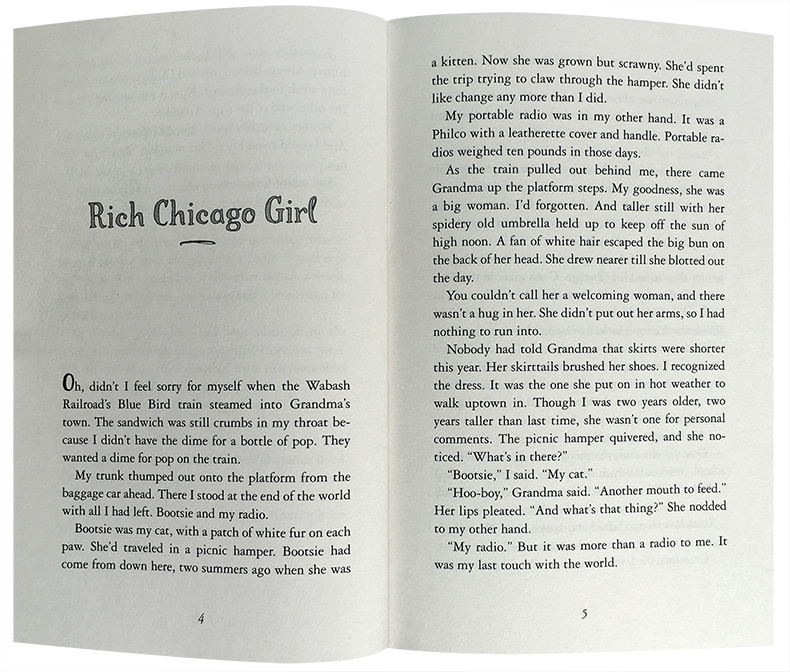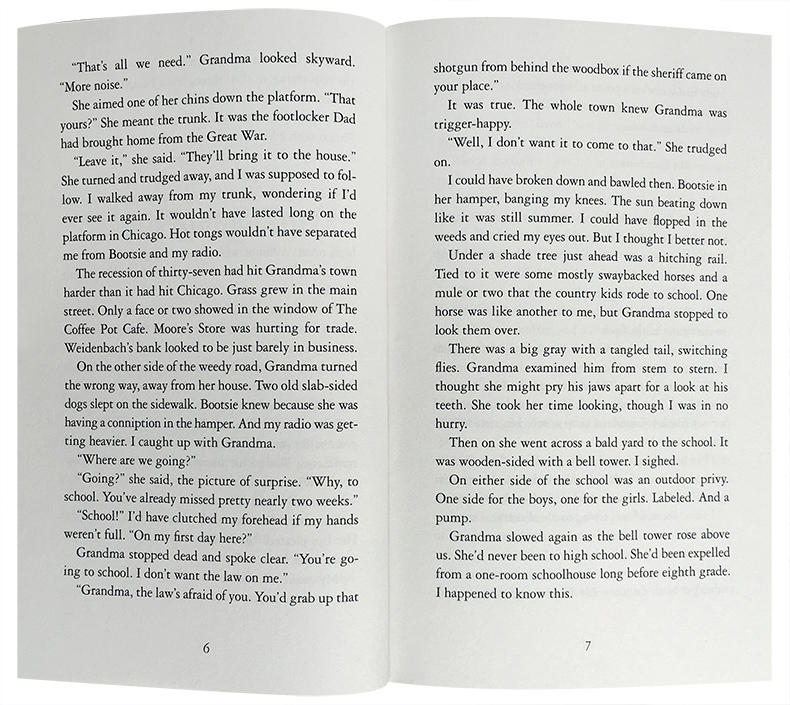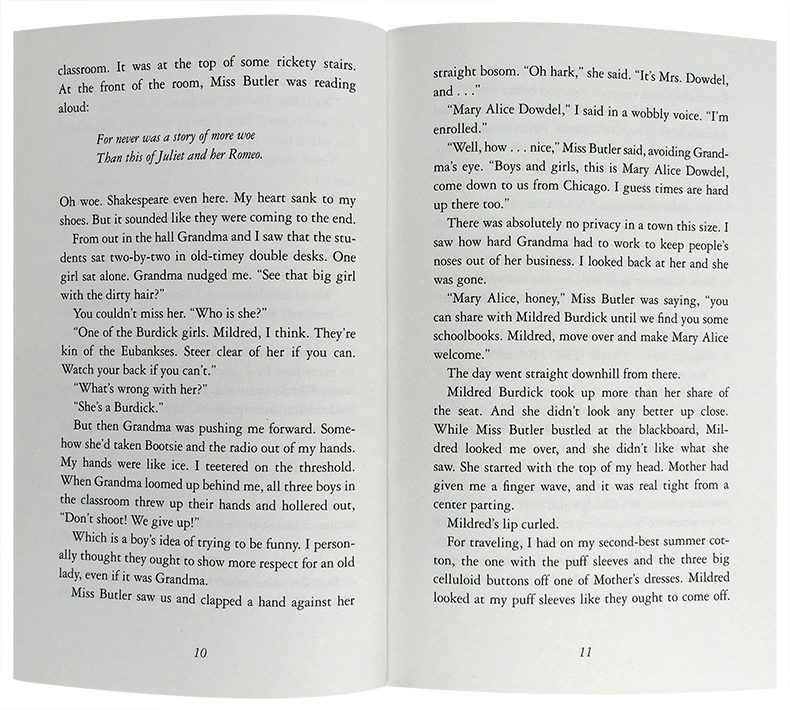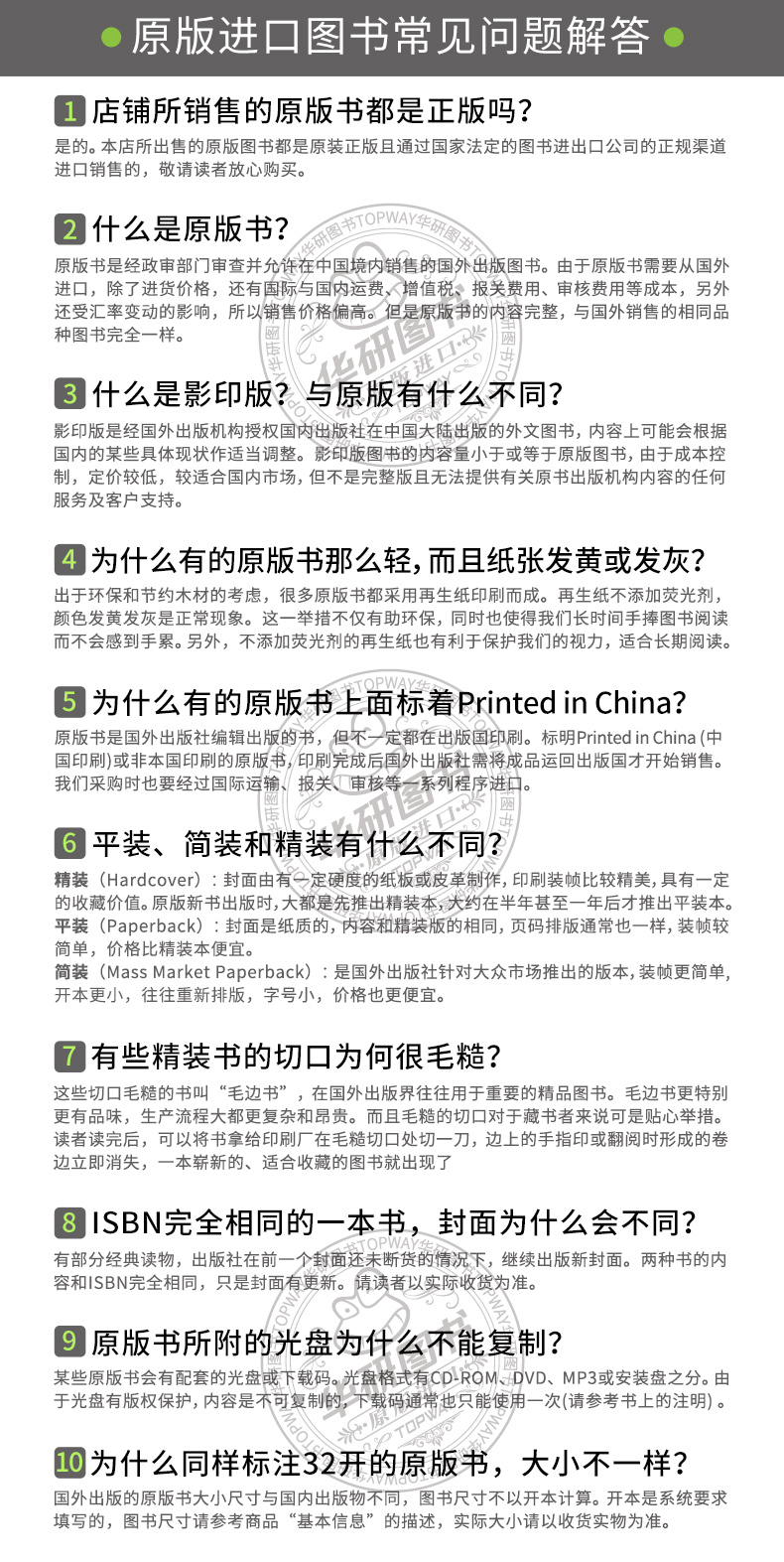英文原版 A Year Down Yonder 背井离乡的365天 纽伯瑞奖小说 儿童文学 Richard Peck 那一年在奶奶家 英文版进口书籍正版
| 运费: | ¥ 0.00-999.00 |
| 库存: | 38 件 |
商品详情





 书名:A Year Down Yonder背井离乡的365天
书名:A Year Down Yonder背井离乡的365天
难度:Lexile蓝思阅读指数610L
作者:Richard Peck理查德·佩克
出版社名称:Puffin Books
出版时间:2002
语种:英文
ISBN:9780142300701
商品尺寸:13 x 1 x 19.7 cm
包装:平装
页数:144 A Year Down Yonder《背井离乡的365天》是美国作家理查德·佩克(Richard Peck)的经典代表作之一。小说在美国经济大萧条的背景下,以妹妹玛丽的视角描写了离开芝加哥的乡下生活、经济疲软的小镇上形形色色的人物以及一个内外形象都相当丰富的角色—— “奶奶”。本书获2001年纽伯瑞儿童文学奖。
A Year Down Yonder《背井离乡的365天》是美国作家理查德·佩克(Richard Peck)的经典代表作之一。小说在美国经济大萧条的背景下,以妹妹玛丽的视角描写了离开芝加哥的乡下生活、经济疲软的小镇上形形色色的人物以及一个内外形象都相当丰富的角色—— “奶奶”。本书获2001年纽伯瑞儿童文学奖。
A Newbery Medal Winner
A New York Times Bestseller
An ALA Notable Book
An ALA Best Book for Young Adults
A Booklist Best Book of the Year
A School Library Journal Best Book of the Year
Review
“In this hilarious and poignant sequel to A Long Way to Chicago, Peck once again shows that country life is anything but boring.” — Publishers Weekly, starred review
“Again, Peck has created a delightful, insightful tale that resounds with a storyteller’s wit, humor, and vivid description.” — School Library Journal
“With the same combination of wit, gentleness, and outrageous farce as Peck’s Newbery Honor book, Long Way from Chicago, this sequel tells the story of Joey’s younger sister, Mary Alice, 15, who spends the year of 1937 back with Grandma Dowdel in a small town in Illinois.” — Booklist
 1937年,由于受美国经济大萧条的影响,玛丽·艾丽斯的父亲失业了,她不得不离开生活了多年的大城市芝加哥,去奶奶居住的小镇读书。
1937年,由于受美国经济大萧条的影响,玛丽·艾丽斯的父亲失业了,她不得不离开生活了多年的大城市芝加哥,去奶奶居住的小镇读书。在小镇生活的一年中,玛丽目睹奶奶干了许多冒险的事:为了参加学校举行的万圣节晚会,她偷来山核桃和南瓜做成馅饼,拿去让大家分享;在停战纪念日那天,她逼富人拿出钱来,救助在战争中受伤的青年;在寒冷的夜晚,她穿过白雪皑皑的田野,去设下陷阱套狐狸换取零花钱……
开始,玛丽感到这一切都是那么的怪异和不可思议。随着时间的流逝,玛丽渐渐理解了奶奶,她学得性格刚强的奶奶心地善良,愿意尽力帮助穷人。她也从奶奶那儿学到了许多生活的技能。
回到芝加哥后,玛丽无法忘记在小镇与奶奶共同度过的365个日日夜夜。在她举行婚礼的那天,她终于又回到了奶奶身边。
Mary Alice’s childhood summers in Grandma Dowdel’s sleepy Illinois town were packed with enough drama to fill the double bill of any picture show. But now she is fifteen, and faces a whole long year with Grandma, a woman well known for shaking up her neighbors-and everyone else! All Mary Alice can know for certain is this: when trying to predict how life with Grandma might turn out... better not. This wry, delightful sequel to the Newbery Honor Book A Long Way from Chicago has already taken its place among the classics of children’s literature.
 Richard Peck, author of more than thirty novels, is one of the most celebrated children’s book writers in the country. He has won the Newbery Medal, the Edgar Award, the Margaret A. Edwards Award, a National Humanities Medal, and twice been a National Book Award finalist, among many other honors. He lives in New York City.
Richard Peck, author of more than thirty novels, is one of the most celebrated children’s book writers in the country. He has won the Newbery Medal, the Edgar Award, the Margaret A. Edwards Award, a National Humanities Medal, and twice been a National Book Award finalist, among many other honors. He lives in New York City. Prologue
Prologue
It was a September morning, hazy with late summer, and now with all the years between. Mother was seeing me off at Dearborn Station in Chicago. We’d come in a taxicab because of my trunk. But Mother would ride back home on the El. There wasn’t much more than a nickel in her purse, and only a sandwich for the train in mine. My ticket had pretty well cleaned us out.
My trunk, a small one, held every stitch of clothes I had and two or three things of Mother’s that fit me. “Try not to grow too fast,” she murmured. “But anyway, skirts are shorter this year.”
Then we couldn’t look at each other. I was fifteen, and I’d been growing like a weed. My shoes from Easter gripped my feet.
A billboard across from the station read:
WASN’T THE DEPRESSION AWFUL?
This was to make us think the hard times were past. But now in 1937 a recession had brought us low again. People were beginning to call it the Roosevelt recession.
Dad had lost his job, so we’d had to give up the apartment. He and Mother were moving into a “light housekeeping” room. They could get it for seven dollars a week, with kitchen privileges, but it was only big enough for the two of them.
My brother Joey—Joe—had been taken on by the Civilian Conservation Corps to plant trees out west. That left me, Mary Alice. I wished I was two years older and a boy. I wished I was Joey.
But I wasn’t, so I had to go down to live with Grandma Dowdel, till we could get on our feet as a family again. It meant I’d have to leave my school. I’d have to enroll in the hick-town school where Grandma lived. Me, a city girl, in a town that didn’t even have a picture show.
It meant I’d be living with Grandma. No telephone, of course. And the attic was spooky and stuffy, and you had to go outdoors to the privy. Nothing modern. Everything as old as Grandma. Some of it older.
Now they were calling the train, and my eyes got blurry. Always before, Joey and I had gone to Grandma’s for a week in the summer. Now it was just me. And at the other end of the trip—Grandma.
Mother gave me a quick squeeze before she let me go. And I could swear I heard her murmur, “Better you than me.”
She meant Grandma.
Rich Chicago Girl
Oh, didn’t I feel sorry for myself when the Wabash Railroad’s Blue Bird train steamed into Grandma’s town. The sandwich was still crumbs in my throat because I didn’t have the dime for a bottle of pop. They wanted a dime for pop on the train.
My trunk thumped out onto the platform from the baggage car ahead. There I stood at the end of the world with all I had left. Bootsie and my radio.
Bootsie was my cat, with a patch of white fur on each paw. She’d traveled in a picnic hamper. Bootsie had come from down here, two summers ago when she was a kitten. Now she was grown but scrawny. She’d spent the trip trying to claw through the hamper. She didn’t like change any more than I did.
My portable radio was in my other hand. It was a Philco with a leatherette cover and handle. Portable radios weighed ten pounds in those days.
As the train pulled out behind me, there came Grandma up the platform steps. My goodness, she was a big woman. I’d forgotten. And taller still with her spidery old umbrella held up to keep off the sun of high noon. A fan of white hair escaped the big bun on the back of her head. She drew nearer till she blotted out the day.
You couldn’t call her a welcoming woman, and there wasn’t a hug in her. She didn’t put out her arms, so I had nothing to run into.
Nobody had told Grandma that skirts were shorter this year. Her skirttails brushed her shoes. I recognized the dress. It was the one she put on in hot weather to walk uptown in. Though I was two years older, two years taller than last time, she wasn’t one for personal comments. The picnic hamper quivered, and she noticed. “What’s in there?”
- 华研外语 (微信公众号认证)
- 本店是“华研外语”品牌商自营店,全国所有“华研外语”、“华研教育”品牌图书都是我司出版发行的,本店为华研官方源头出货,所有图书均为正规正版,拥有实惠与正版的保障!!!
- 扫描二维码,访问我们的微信店铺
- 随时随地的购物、客服咨询、查询订单和物流...










